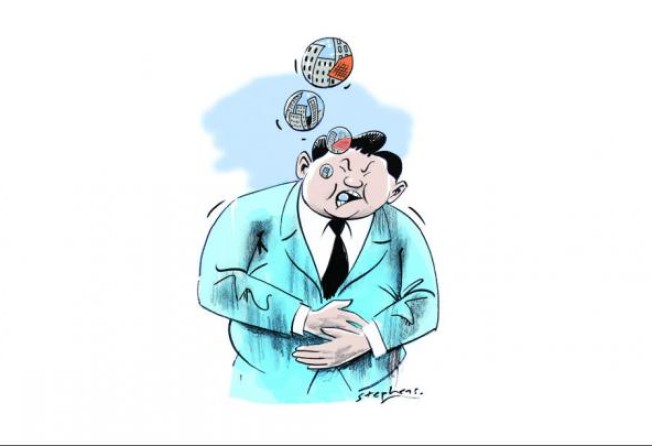China can afford to let its bubble economy burst
Andy Xie says China should wean itself off the bubble economy that's now doing more harm than good, by tightening its money supply and restraining its rampaging state sector

Right before unveiling the new cabinet line-up, the Chinese government announced it would strictly enforce a 20 per cent capital gains tax on property sales. It was presented as a response to the resurging speculation in the market. Does it signal that the new government won't tolerate the property bubble? It is too early to say.
Speculation and corruption have come to dominate China's economy since 2007. The two form a temporary equilibrium to sustain growth, though at increasingly low efficiency, as reflected in the rising inflationary tendency of the economy.
China has depended on rapid monetary growth, through bank lending, to fund fixed-asset investment. A significant chunk of the monetary growth becomes corrupt income. The renminbi's appreciation outside China, and depreciation at home due to inflation, have pushed the surplus liquidity into the property market, which then becomes government revenue again.
Through recycling the corrupt income into the government's coffers, property speculation has been critical to the stability, albeit temporary, of China's current growth model. Hence, cutting off property speculation without stopping corruption would lead to currency devaluation and an economic hard landing.
The latest surge in speculation came after government action late last year. Starting in late 2011, the property market has collapsed in overdeveloped cities such as Ordos , Wenzhou and Sanya . With negative sentiment spreading, the resulting fall in local government revenue led to action to rescue the market. Banks eased restrictions for second or third mortgages. State-owned enterprises borrowed to bid up land prices, pumping up price expectations. Inflation accelerated, scaring anyone with cash in hand. And, lastly, the renminbi began to hit new highs. These four forces have propelled property speculation again.
The same thing happened in 2008, though on a much larger scale. The global financial crisis spooked China's speculators and the market pretty much collapsed across the board. The ensuing stimulus policy used credit to reinflate the property bubble. This was done by expanding the M2 money supply, which doubled in four years. History will judge that the 2008 stimulus policy sent China's economy down the path to crisis.
One school of thought believes that speculation can be managed and used to develop the economy. China's confused policy response to speculation should be seen in that context. The property market is of course useful in keeping corrupt money inside the country; its outflow would devalue the currency. The costs are, however, bigger and longer-lasting.
China's wealth inequality is a result of the bubble economy, not market competition. In this light, some proposed remedies for redistribution are laughable. The problem is the system itself. How could adding another layer solve anything?
China has an absolute oversupply of property. The vast stock of sold but empty flats reflects the twin expectations of inflation at home and currency appreciation offshore. Prolonging the bubble will only bring a bigger bill in the end, mostly in bad loans. If bank recapitalisation can't be achieved without the help of devaluation, that could precipitate massive capital flight and an economic collapse.
The need to sustain growth to curb unemployment has been used to justify the policy bias in maintaining the bubble. But China has experienced years of blue-collar labour shortages. The bubble economy is good at creating blue-collar jobs. Hence, China today has a labour shortage and an inflation challenge. How can sustaining the current growth dynamic be justified?
Of course, the real reason for the bubble economy is that vested interests depend on it to get rich quick.
While such an economy harms people through inflation and damages the environment they live in, their acquiescence has been bought by the prospect of getting rich. The homes they occupy might make them rich; the stock market could double or triple. This "get rich quick" dream has bought China stability so far. But when people realise it will remain a dream for most, how will they react?
Now is a good time for China to consolidate. The labour shortages mean an economic downturn won't disrupt social stability. The resulting fall in inflation would enhance it. Food and water safety, air pollution, education and health care are issues that require urgent attention. Leaders should root out speculation and corruption, and focus on livelihood issues.
The new government espouses China's revival as a national dream. Speculation and corruption, the old diseases in China's governance and society, have set back that dream before and could do so again. The new government needs to show resolve in dealing with both.
To hold down speculation and corruption, it should control money supply to a level consistent with price stability and hold down public-sector expansion. It is too tempting to keep monetary policy loose and manufacture price stability by massaging statistics. But the people can't be fooled all of the time. The recent surge in money supply isn't a good sign. Urgent action is needed.
Limiting public-sector expansion will ultimately determine China's future. Only excessive government expansion can derail the three-decade-long growth trend. China's strength is its vast, hard-working population; government overreach is its weakness. The balance between the two will determine whether China prospers or not.
The government has announced some targets for holding down spending. It is a good sign. But, the most important measure is to cap fiscal expenditure and investment by state-owned enterprises.
In China, an expanding public sector is squeezing the growth of the household sector and private enterprises. The government should target zero growth for the public sector and give the country breathing space to recover. Only in this way can China's economy embark on another growth cycle.
Andy Xie is an independent economist